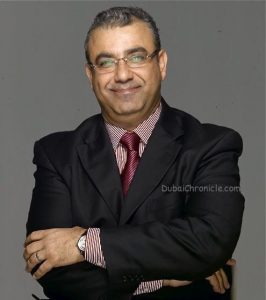Exclusive interview for DubaiChronicle.com
 To predict an economy’s direction may be almost impossible or the least a risky venture. Nevertheless, many research companies, market analysts and consultancy firms are highly paid to do exactly that. Now, in the beginning of the summer, visionaries can be additionally confused by seasonal business slowdown and pessimistic international news flow.
To predict an economy’s direction may be almost impossible or the least a risky venture. Nevertheless, many research companies, market analysts and consultancy firms are highly paid to do exactly that. Now, in the beginning of the summer, visionaries can be additionally confused by seasonal business slowdown and pessimistic international news flow.
In times of uncertainty, industry insiders’ personal views describe Dubai’s business environment clearer than any economic reports.
Dubai Chronicle’s editor discussed Dubai’s economic situation with Sindbad Al-Mahaire, Managing Director of Byteware Technology LLC. The Dubai-based company provides telecommunication systems for corporate businesses for nearly two decades.
Here is the transcript of the exclusive interview for DubaiChronicle.com:
Q.: Please share your views on the current status of Dubai’s economy.
A.: This will take a little long to explain. Any objective economic forecast should be based on the current facts and the near term projections, in my opinion. How many people do we have; how many we expect to come and what do we need to do to accomodate them? Dubai could be described as a transitional city. Expatriates come and go. On average, a foreigner stays in the UAE for about 15 years, according to my observations.
The major strength of Dubai and the country is that provides very good infrastructure for businesses. This attracts foreign companies to set up regional headquarters. For example, as of now more than 3,000 Saudi companies operate form UAE.
Q.: How would you explain the exodus of expats in recent years and even in recent months? Dubai Police still reports large numbers of cars being left on the streets.
A.: As I said, Dubai is a city with transitional character. People come and leave all the time. What is not enough for some, it could be plenty for others.
To get the big picture, you should examine the financial and banking system. In UAE, the banking system is very solid, highly profitable and secure. On the retail part, interest rates remain high. For example ADCB charges 3.09% interest on retail purchases through credit cards. The risk of loan defaults is minimized. If you don’t pay your car or home loan, the bank can sell the asset and recover its losses.
Investment banking is also very profitable. UAE is the seventh large oil producer worldwide and the population is rich. Investment bankers are highly paid; investment products normally generate substantial profits and money managers charge enormous fees for their services.
I think, Dubai is the best business model in the Arab world. It generates internal and external income. For example, the city invests heavily in tourism to bring visitors, who on their part spend large amounts of money in the hotels, the restaurants, at the shopping malls and also for plane tickets at the local airlines.
Q.: Do you think that the success of Dubai can be replicated anywhere else in the Arab world?
A.: No, I am certain the success of Dubai can’t be replicated, but it can be completed. It requires enormous ambition, strong leading personality, total commitment and substantial investments. Timing is also important. Dubai exploded during the last 12 or 15 years, when the global economy was not on the downturn.
Q.: How do you see the future of Dubai?
A.: The city will continue to grow. Logistic factors have established values in the long run. Infrastructure for businesses is already developed.
Q.: Do you think that a mini boom is possible?
A.: No, there will be no new boom, in my personal opinion. Especially, I can’t see it coming from within the real estate sector. I think, the economy will continue to expand steadily. In particular, trade, logistic, manufacturing and tourism industries will provide plenty of opportunities. Healthcare and education sectors require talent, which is expensive and hard to attract.































